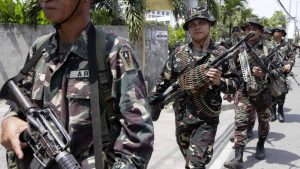The Philippine military said it has arrested a Muslim cleric who knew in advance about a bomb that killed 11 people on Basilan Island in an attack earlier this week that raised fears of Islamic State involvement, like reported by irrawaddy.com.
Acting on a tipoff, scout rangers raided the home of Indalin Jainul, alias Ustadz Abdulgani, 12 hours after Tuesday’s bombing in Lamitan town.
Informants told the army that the cleric, 58, knew the bomb would go off and had been helping foreign operatives reach Basilan from Malaysia, according to army spokesman Gerry Besana. A grenade was found at his home.
Jainul is being charged with multiple murder and illegal possession of explosives. His family protested what they said were trumped-up charges.
Islamic State claimed responsibility for the attack, which killed five militia members, a soldier, and four civilians, including a child, calling it a “martyrdom operation.” The driver of a van carrying the device also died. He was believed to have detonated the device when questioned at the checkpoint.
Defense and military officials dismissed the Islamic State claim as propaganda, with Defense Secretary Delfin Lorenzana describing the claim as “just speculation.” Basilan is a stronghold of the Abu Sayyaf, a group known for its banditry and kidnapping, though it has pledged loyalty to Islamic State.
The attack came days after Philippine President Rodrigo Duterte made peace overtures towards the Abu Sayyaf, following his approval for an autonomy plan sought for decades by leaders of the region’s Muslim minority.
Vehicle bombings are rare in the Philippines, despite decades of separatist and Islamist violence that have destabilized the southern Mindanao region.
Security experts say that although Islamic State has no known affiliate in the southern Philippines, it has ties with local extremists who have given refuge to foreign radicals, particularly from Malaysia and Indonesia.
The scope of Islamic State’s influence became clearer last year when an alliance of black-clad fighters occupied Marawi City for five months, taking hostages, destroying churches and flying black flags in scenes reminiscent of Iraq and Syria. More than 1,100 people were killed.



